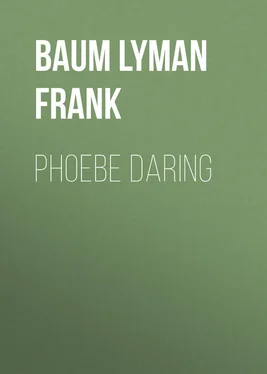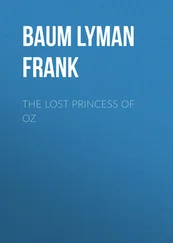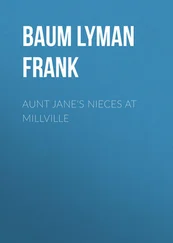Lyman Baum - Phoebe Daring
Здесь есть возможность читать онлайн «Lyman Baum - Phoebe Daring» — ознакомительный отрывок электронной книги совершенно бесплатно, а после прочтения отрывка купить полную версию. В некоторых случаях можно слушать аудио, скачать через торрент в формате fb2 и присутствует краткое содержание. Жанр: foreign_antique, foreign_prose, на английском языке. Описание произведения, (предисловие) а так же отзывы посетителей доступны на портале библиотеки ЛибКат.
- Название:Phoebe Daring
- Автор:
- Жанр:
- Год:неизвестен
- ISBN:нет данных
- Рейтинг книги:5 / 5. Голосов: 1
-
Избранное:Добавить в избранное
- Отзывы:
-
Ваша оценка:
- 100
- 1
- 2
- 3
- 4
- 5
Phoebe Daring: краткое содержание, описание и аннотация
Предлагаем к чтению аннотацию, описание, краткое содержание или предисловие (зависит от того, что написал сам автор книги «Phoebe Daring»). Если вы не нашли необходимую информацию о книге — напишите в комментариях, мы постараемся отыскать её.
Phoebe Daring — читать онлайн ознакомительный отрывок
Ниже представлен текст книги, разбитый по страницам. Система сохранения места последней прочитанной страницы, позволяет с удобством читать онлайн бесплатно книгу «Phoebe Daring», без необходимости каждый раз заново искать на чём Вы остановились. Поставьте закладку, и сможете в любой момент перейти на страницу, на которой закончили чтение.
Интервал:
Закладка:
“They never bothered him, neither,” Don reminded her. “That old cupboard’s been stuffed full of valuable papers and tin boxes for years, an’ not a soul ever touched ’em.”
“Oak doors, strong boxes and good locks,” said Phoebe; “that accounts for their past safety. Those cupboard doors are as strong as a good many safes, and as far as burglars are concerned, they manage to break in anywhere if they get the chance. I don’t believe anyone but a professional burglar could steal Mrs. Ritchie’s box, and no burglar would take hers and leave all the others. Still, if it wasn’t stolen, where is it? That’s the question.”
“It’s more than a question, Phoebe,” replied Don; “it’s a mystery.”
CHAPTER IV
HOW PHOEBE BECAME WORRIED
Reflecting on the astonishing information Don had conveyed, Phoebe went to her room and sat down at a small table near the window to which was fastened a telegraph instrument, the wire leading outside through a hole bored in the lower part of the sash.
A telegraph instrument is indeed a queer thing to be found in a young girl’s room, yet its existence is simple enough when explained. Riverdale was an out-of-the-way town, quite as unenterprising as many Southern towns of its class. Its inhabitants followed slowly and reluctantly in the wake of progress. They had used electric lights since only the year before, getting the current from Canton, ten miles away, where there was more enterprise and consequently more business. Canton also supplied telephone service to Bayport and Riverdale, but the cost of construction and installation was considered so high that as yet Riverdale had but three connections: one at the post office, a public toll station; one at Spaythe’s bank and one at the newspaper office. The citizens thought these three provided for all needs and so they did not encourage the Canton telephone company to establish a local exchange for the residences of their village.
Some were annoyed by this lack of public interest in so convenient a utility as the telephone. The Randolphs would have liked one in their house, and so would the Darings, the Camerons, the Fergusons and a few others; but these were obliged to wait until there was sufficient demand to warrant the establishment of an exchange.
The telegraph operator of the village was a young fellow who had been a schoolmate of both Phil and Phoebe Daring, although he was some few years their elder. Dave Hunter had gone to St. Louis to study telegraphy and afterward served as an assistant in several cities until he finally managed to secure the position of operator in his home town.
The Hunters were nice people, but of humble means, and Dave was really the breadwinner for his widowed mother and his sister Lucy, a bright and pretty girl of Phoebe’s age. Encouraged by her brother’s success, Lucy determined to become a telegraph operator herself, as many girls are now doing; but to avoid the expense of going to a school of telegraphy Dave agreed to teach her during his leisure hours. In order to do this he stretched a wire from his office to his home, two blocks away, and placed instruments at either end so that Lucy could practice by telegraphing to her brother and receiving messages in reply.
She was getting along famously when Phoebe Daring and Nathalie Cameron called on her one day and were delighted by her ability to telegraph to her brother.
“Why, it’s as good as a telephone, and much more fun,” declared Phoebe, and Nathalie asked:
“Why couldn’t we have telegraphs in our own houses, and get Dave to teach us how to use them? Then we could talk to one another whenever we pleased – rain or shine.”
The idea appealed to Phoebe. Lucy telegraphed the suggestion to her brother and he readily agreed to teach the girls if they provided instruments and stretched wires between the various houses. That would be quite an expense, he warned them, and they would have to get permission from the village board to run the wires through the streets.
Nothing daunted, they immediately set to work to accomplish their novel purpose. Marion Randolph, the eldest of the Randolph children, was home from college at this time and entered heartily into the scheme. They were joined by Janet Ferguson, and the four girls, representing the best families in the village, had no trouble in getting permission to put up the wires, especially when they had the judge to argue their case for them.
Dave, seeing he could turn an honest penny, undertook to put up the wires, for there was not enough business at the Riverdale telegraph office to demand his entire time and Lucy was now competent to take his place when he was away. He connected the houses of the Darings, the Randolphs, the Camerons and the Fergusons, and then he connected them with his own home. For, as Lucy was the original telegraph girl, it would never do to leave her out of the fun, although she could not be asked to share the expense.
Lucy seemed a little embarrassed because Dave accepted money for his work and for teaching the four girls how to operate. “You see,” she said one day when they were all assembled in her room, “Dave has lately developed a money-making disposition. You mustn’t breathe it, girls, but I’ve an idea he’s in love!”
“Oh, Lucy! In love?”
“He’s been very sweet on Hazel Chandler, the postmaster’s daughter, of late, and I sometimes think they’ve had an understanding and will be married, some day – when they have enough money. Poor Hazel hasn’t anything, you know, for there are so many in the Chandler family that the postmaster’s salary and all they can make out of the little stationery store in the post office is used up in living.”
“It’s used up mostly by Mrs. Chandler’s social stunts,” declared Nathalie. “She’s proud of being the leader of Riverdale society, and a D. A. R., and several other things. But doesn’t Hazel get anything for tending the shop and handing out the mail when her father is away?”
“Not a cent. She’s lucky to get her board. And when she’s not in the shop her mother expects her to do housework. Poor thing! It would be a relief to her to marry and have a home of her own. I hope Dave’ll manage it, and I’d love to have Hazel for a sister,” said Lucy. “Mind you, girls, this is a secret; I’m not even positive I’m right in my suspicions; but I wanted to explain why Dave took the money.”
“He was perfectly right in doing so, under any circumstances,” declared Phoebe, and the others agreed with her.
Phoebe and Marion learned telegraphy very quickly, developing surprising aptitude; Nathalie Cameron was not far behind them, but Janet Ferguson, a remarkably bright girl in her studies, found the art quite difficult to master and made so many blunders that she added materially to the delight they all found in telegraphing to one another on all possible occasions. When Marion went back to college the other four continued to amuse themselves by gossiping daily over the wire; but gradually, as the novelty of the thing wore away, they became less eager to use their lately acquired powers and so, at the period of this story, the click of an instrument was seldom heard except when there was some question to ask or some real news to communicate. By concerted arrangement they were all alert to a “call” between six and seven in the evening and from eight to nine in the mornings, but their trained ears now recognized the click-click! if they were anywhere within hearing of it.
Cousin Judith was much amused and interested in this odd diversion of Phoebe’s, and she recognized the educational value of the accomplishment the girl had acquired and generously applauded her success. Indeed, Phoebe was admitted the most skillful operator of them all. But aside from the amusement and instruction it furnished, the little telegraph circuit was of no practical value and could in no way be compared with the utility of the telephone.
Читать дальшеИнтервал:
Закладка:
Похожие книги на «Phoebe Daring»
Представляем Вашему вниманию похожие книги на «Phoebe Daring» списком для выбора. Мы отобрали схожую по названию и смыслу литературу в надежде предоставить читателям больше вариантов отыскать новые, интересные, ещё непрочитанные произведения.
Обсуждение, отзывы о книге «Phoebe Daring» и просто собственные мнения читателей. Оставьте ваши комментарии, напишите, что Вы думаете о произведении, его смысле или главных героях. Укажите что конкретно понравилось, а что нет, и почему Вы так считаете.












